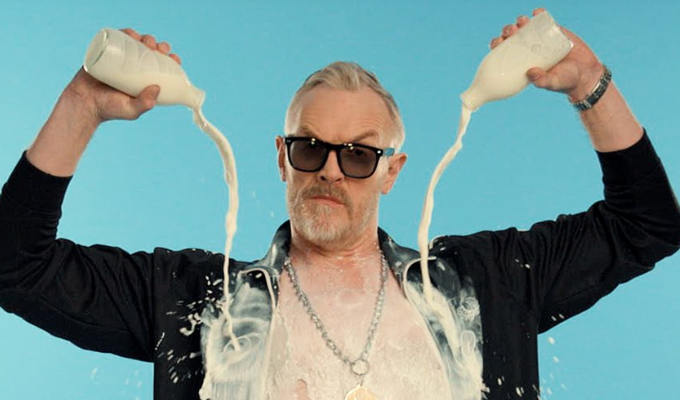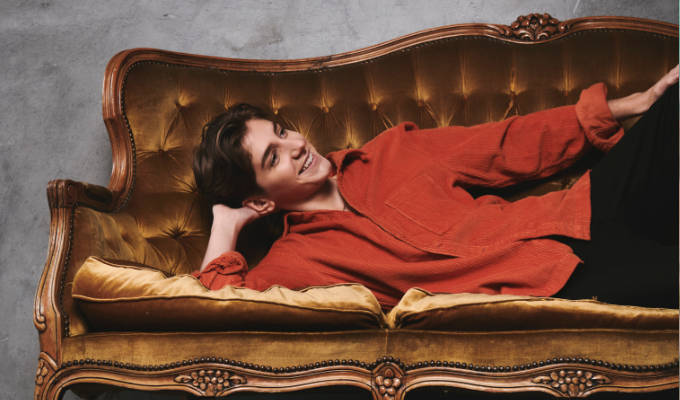New Act Of The Year at the Barbican
Reviewed by Corry Shaw
If variety is the spice of life then this years rebranded Hackney Empire New Act Of The Year Award was a veritable vindaloo. MC Arthur Smith is quick to point out the transformation to the fancy new digs at the Barbican, and the shift from the straight stand-up bills of a decade ago to a show that is more cabaret than comedy in places.
Never is this more apparent than with the first act, Steve Aruni and Henry the Hoover. Aruni wheels on his vacuum linked up to a computer, which allows Henry to sing and play saxophone. Different? Yes. Funny? Debatable. The ingenuity does not make up for the poorly written Butlinsesque material. The observation that hands-free phones make people look a little crazy and the outdated assumption that a single woman drinking alone in a bar is a slag don't make for comedy gold. Although the gimmick is unique, and the performance skills strong, the concept had very little payoff.
Chortle student finalist from 2007 Prince Abdi has the difficult task of being the first 'traditional' stand-up of the night. It was bound to be hard following a singing hoover but Abdi's boundless energy and well-crafted punchlines eased the crowd into the comedy nicely. After some decent, if predictable, lines about his Somalian heritage, he quickly moves on to more common topics. There is real familiarity in some of his set-ups, with hints of the late Jason Wood in his Bollywood set piece and Mark Watson in his disappointed mugger story. But there is just enough of Abdi in these routines to put his own feint stamp on them, and the judges award him a joint second place.
Tania Edwards follows with a strong stage presence and a mischievous likeability. Her material is mainly disappointing, however, with her uninspired tales of woe that Ladbrokes won't take a bet on when her mum will die, while her shock that people find it surprising that a 30-year-old woman doesn't want kids feels stilted and outdated. She does however, have a couple of inspired lines that demonstrate her writing promise, including one of the best gags of the night about her 'schoolboy errors'. Certainly one to watch if her writing starts living up to the promise of her assured delivery.
On to the first of our the sketch groups, McNeil & Pamphilon. Their acting skills produce sketches that may sit well in an hour-long show but are lost in an eight-minute segment. Sketch groups in this final are given extra time to perform, as it can take a while to set up and execute skits while building rapport, but McNeil & Pamphilon's opening piece – a fast-paced, tightly-scripted job interview resulting in immediate redundancy – seemed only to alienate the audience. The duo won some over with a more relaxed conversation about the apparently confusing notions that milk comes from cows but is not, in fact, cow cum. Sadly the goodwill is lost again when they finish on a deconstructed comedy song. A tired idea which they clearly recognise with the inclusion of the line ‘please pretend you liked it and don't boo’. Such flagrant self (and genre) deprecation calls for something worthwhile to deprecate. A different finale would have served them better.
David Mills takes to the stage with the air of a pro and confidently stumbles into his set with some ad-libbing about the size of the impressive Barbican stage. He takes a moment to hit his pace but when he does it is clear we are not watching a 'new act'. Mills performs his five minutes seated after declaring he needs a 'hard stool' and brought an air of intimacy to this huge theatre show, drawing the audience in with his conversational asides.
It is hard to determine whether his acidic approach is more influenced Clarey or Capurro but when he launches into his descriptions of his neighbourhood, it is clear that he would rather fall on the side of the edgier Capurro, with whom he frequently collaborates. Sections of the audience were audibly unimpressed with his descriptions of the 'super Islamic' Bethnal Green where they ‘wear tabboulehs and Baba Ganouches’ and the difficulties he has determining the students from the Muslims as everyone is wearing pyjamas.
The remainder of his five minutes proves less controversial as he examines the non-problems that the Apple Corporation has fixed, taking his sweet time demonstrating the massive improvement that has come from swiping a screen rather than turning a page. His material may be wobbly, but his performance is flawless and this secured him the first place spot.
In stark contrast with Mills’s polished performance was sketch group number two, Asian Provocateurs, who brought the energy and intimacy crashing to a halt. Sajeela Kershi and Yasmeen Khan proclaim they are not there to pander to ethnic stereotypes, yet end their set with the extraordinarily embarrassing attempt at audience participation while donning false beards and woeful Arabic accents to masquerade as Taliban tour guides. As they plead with the audience to ‘join in with jazz hands’ the crowd responds the way they have for the previous eight minutes by ignoring them entirely. Painful.
An antidote to such mediocrity comes courtesy of the assured and brilliant writing of Julian Deane. The most underplayed and honest act of the evening, Deane is a class apart. Each seemingly everyday tale ends with a brilliant and believable punchline, the majority of his set deals with his changing relationship with his growing children and provides a real insight into his world. A master of the pull back and reveal, Deane consistently rewards the audience with hilarious twists and turns. His one minor fault is his insistence on pointing out 'this is true' before each tale, which can destroy the belief that it is. But this is a small flaw and it is surprising he didn't claim the top spot, rather than his joint second placing.
What is a variety show without a magician? Well Javier Jarquin can't help with that – but he does have cards. He proclaims that he failed as a magician so wanted to be a ninja. His talents mainly involve throwing cards around the stage in varying ways then pausing for applause. The polite Barbican clientele oblige until the act is over.
After the interval, room-splitting conceptual comic David Trent takes the mic. His use of video, animation and repetition is brilliant and unique, enough to win over a proportion of the judges and crowd – but there are some increasingly bewildered faces as he repeatedly shows video of a woman dropping a watermelon off a building to prove the existence of God and other random assertions. This is either genuine originality and talent or a very lucky man stumbling across laughs. Personally I'd go with the former, and found his section one of the most entertaining and humorous of the show.
Uberscripted character comedian Nathaniel Tapley brings us a Tory spokesman with some topical material about Libya and some not-so topical jibes at Margaret Thatcher. More of an actor than a comedian, he ploughs through his monologue with little regard for audience response or interest, and seems not to know how to conclude his rant so mimes an ejaculation and leaves the stage. A cold, clinical character but showing some real acting skill.
Rachel Parris brings some warmth back to the room with her comedy songs and delightfully accessible and likeable persona. A genuine sweetness counteracts the darker elements of her character, and she has a natural charm and keen eye for observation. Her entertaining ditties, such as the opener about the first kiss, are punctuated with some well-crafted lines about drinking. And at last an act gets the room on side enough to participate in a singalong, which is true testament to her skill as a performer.
But for a true lesson in performance we need look no further than third placed Darius Davies. If ever there was a marketing campaign for style over substance Davies would be the poster boy. Like a charmless, less original version of Danny Bhoy he leaps round the stage with the confidence of an act playing a sold-out Apollo run. What nuggets of comedy gold does he present to match this huge performance? ‘Your mum is so fat’ jokes and the observation that it is annoying when people play music over their mobile phones on pubic transport. To be fair. the 'mum' jokes are one level up from playground taunts with a very basic twist thrown in, but it is a tokenistic nod to becoming a respectable act. This is gold-plated garbage and it's genuinely amazing that the sheen was enough to win him his fourth placing.
Proud communist Joe Wells thankfully appeals to the intellect as he discusses the BNP's misunderstanding of flags, fascist propaganda and what would happen if Richard Littlejohn and a harsh comedy reviewer fought to the death. There are solid gags throughout with some unexpected and beautiful turns of phrase. Wells has clearly worked hard building his set, which is well paced, interesting, balanced and funny. It should have seen him place in this final.
Finally Scottish sketch troupe How Do I Get Up There, the most likeable group of the night, with a nice mixture of traditional set pieces and lighter conversational skits. They have even managed to find an imaginative twist on the 'narrating our sketch sketch', while their 'thought charades' game proves a brave move as it calls for complete silence in the audience with the hope of a big laugh as a pay-off. They got it, and the marathon show finished on a high.
Published: 21 Mar 2011






